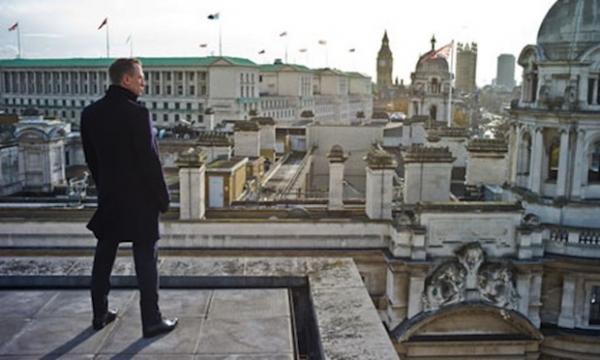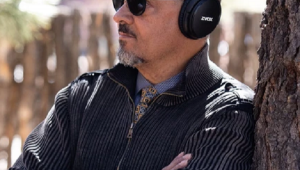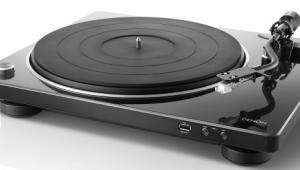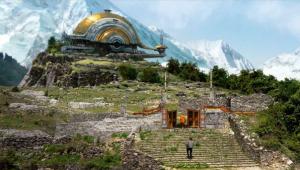Skyfall: Selling England by the Pound

Bond is back, and better than ever, in Skyfall (MGM/Eon Productions). The film marks the 50th anniversary of the series that's seen us through the Cold War, with a variety of actors capturing the iconic 007 through 23 films. As with every good anniversary celebration, this one reflects on a glorious past - and imagines an equally glorious future.
From the very first chords, with that classic orchestration we've heard for 50 years, we know this is a Bond film. A damn good one at that. People are already talking about Academy Award nods for either Best Picture, or Best Actress for Dame Judi Dench's moving portrayal of spymaster M. And Skyfall introduces something rare into the franchise: emotion. Whether it's Bond's poignant backstory or his love and respect for a friend, Skyfall has it all. Daniel Craig has fans and foes as Bond, but one thing is for sure: we see him as fallible and vulnerable in this installment, with deep wells of emotion driving him. On the other hand, he's still Bond: You can blow up his headquarters, you can destroy the London Underground, but don't you mess with his car.
Skyfall is also something of a love letter to Great Britain. The views of London, the references to the legend of King Arthur and Malory's "Le Morte D'Arthur," the quotes from Tennyson, the brooding solitude of the Scottish moors, and especially the Batman-esque shot of Bond looking out over London and its flags taut in a stiff breeze, all point to the filmmakers' pride of country.
There's more Academy Award talk for Adele's haunting theme song, played over one of the most interesting and complex opening-credit sequences seen in a Bond film. Continuing in their theme of showing off the UK in a most favorable light, it's no wonder that the producers chose Adele for the honor of co-writing and performing the theme. There might be one hitch, however. A snippet of the original Bond theme, written in 1962 by Monty Norman and arranged by composer John Barry, is mixed into her song. Unfortunately, the Academy Award rules for Best Original Song state: "An original song consists of words and music, both of which are original and written specifically for the motion picture." Those few notes might make her ineligible.
The rest of the score, by Thomas Newman, is pitch perfect. During the tense opening action scene on a speeding train, the music has a pulsing locomotive beat. When the action moves to Shanghai and Macau, the score takes on a percussive techno feel that's appropriate for the bright lights and fast pace of those exotic cities.
Without spoiling too much, let's just say that the sound design of a certain car's deep, throaty engine makes the sound engineer in me positively giddy. It's so lovingly portrayed that the car becomes a character in the film (at my showing, the audience burst into applause on its appearance.) That sound, mixed with the resurrection of the iconic surf-guitar Bond theme, creates one of the best 60 seconds of movie soundtrack you'll ever hear.
In fact, the entire sound design is fabulous, ranging from massively impactful moments (the subway – excuse me, the Metro – crash is humongous) to the very subtle blending of rain into a waterfall at the end of the opening action scenes. Perhaps the most subtle effect is the looming rumbles of distant trains overhead when MI6 is moved to subterranean tunnels and bunkers, foreshadowing the later scenes in the subway. Perhaps it was the mix in the IMAX theater I was in, but the surround effects of a helicopter circling overhead were a bit, excuse the pun, over the top. Had more of the movie had more sounds mixed into the surrounds, it could be overlooked. As it was, it felt gimmicky. However, there was wonderful use of organic wave sounds to transition between scenes and moods; again, a real subtle, yet effective sound design. Supervising Sound Editor Karen Baker Landers has said that if a sound is there, it's for a reason; if a sound is not there, it's for a reason. Every sound - stylized or not - is critical.
Cinematographer Roger Deakins could also get a nod from the Academy. Every city featured in the film looks spectacular, but in particular, the lighting and cinematography of the action sequences in Shanghai are unique and original, and utterly effective. His use of shadows and silhouettes, especially when the burning building's flames cast light across the moors in Scotland and silhouette the villian, is something that film students might want to study.
All of these components are wrapped up by director Sam Mendes into a polished package that delivers to audience on all levels. Nostalgic fans of the Bond series will not be disappointed, and new audiences will appreciate the complexity of the story and the excitement of the action sequences. The cast - particularly Judi Dench and the magnificently creepy Javier Bardem - is superb. Bardem's introductory monologue will forever change your perspective on rats.
Is Skyfall the best Bond film ever? It has everything we expect from a Bond film: awesome theme song, gorgeous women, edge of the seat action, breathtaking locales, and even a few good laughs. There are some great homages to previous Bond films, with the wry wit that sets the series apart from other action thrillers. Some Bond is gone; you won't see any exploding pens because, well, "We don't really go for that anymore." But the essential Bond is firmly intact because, "Every now and then, a trigger has to be pulled."
In the end, instead of moving on to a new and different type of Bond, we're returned to the Bond we've known for 50 years. He's not Bourne, he's not Batman. He's Bond. James Bond.
- Log in or register to post comments




































































